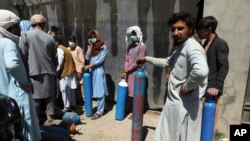Authorities in Afghanistan confirmed Saturday the delta coronavirus variant, first identified in India, has been mainly responsible for the recent surge in cases and deaths in the war-torn country.
Minister for Public Health Wahid Majrooh told reporters in Kabul that out of 19 samples examined in national laboratories a day earlier, nearly 60% tested positive for the delta variant and the rest for a British variant.
“It shows the delta variant of the coronavirus is rapidly spreading in Afghanistan, and this is the main reason for the rise and criticality of the cases,” Majrooh warned in his nationally televised news conference.
The minister stressed the crisis required the Afghan nation to strictly observe safety guidelines to help contain the spread of the delta variant, which is more infectious and more resistant to existing vaccines.
The coronavirus, which causes COVID-19 disease, hit Afghanistan early last year, infecting 114,000 people and killing 4,600 to date.
Afghan officials have documented an average of more than 80 deaths a day, however, from COVID-19 over the past week or so. The data accounts only for a fraction of cases, though, because of capacity issues and a lack of access to areas controlled by the Taliban insurgency.
The pandemic has led to a shortage of medical oxygen, with hospitals throughout Afghanistan refusing to accept new coronavirus patients, citing a lack of beds and other shortages.
The outbreak forced the U.S. Embassy in Kabul to lock down much of the diplomatic mission after dozens of its staff contracted the coronavirus.
The pandemic has gripped Afghanistan as U.S. and NATO allies are withdrawing their troops from the country after nearly 20 years of presence. The retrograde process is due to be complete by September 11.
Meanwhile, the Taliban has intensified battlefield attacks against government forces, capturing more territory. The deteriorating security has added to the challenges facing Afghan health authorities in battling the COVID-19 outbreak.
Afghan authorities are said to have administered 766,000 doses of the coronavirus vaccine in a country with an estimated population of more than 35 million people, with less than a half percent fully vaccinated so far.
The conflict and suspicions about vaccines are blamed for the slow-moving national inoculation campaign. Kabul has received donations of the AstraZeneca vaccine from India and the Sinopharm vaccine from China.
The United States has pledged to deliver 3 million doses of the single-shot Johnson & Johnson coronavirus vaccine as early as next week to help the Afghan government combat what is being termed the deadliest wave of the pandemic.





